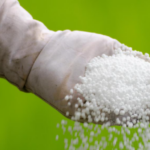UPPER CHITRAL, Aug 06 (APP): : With fall of sun rays on his tent early morning, the poor wood seller Ali Zafar (48), started his painstaking journey towards nearby mountains to collect stones for reconstruction of his three marla house, swept away by the recent flash floods and torrential rains in Upper Chitral.
Commonly known as ‘Shino Lala ’ in his native village due to his blue eyes, Ali Zafar after having breakfast, fasten big saddlebags to his two mules and moved towards the mountains to collect as much stone slabs as possible for construction of his house in village Meragram.
The stone-made house of the poor wood seller was completely destroyed by the July 12 floods here.
“I was offering Fajar prayer on the fateful morning of July 12 when the gushing water from Tirich Mir mountain ranges came in a jiffy and swept away my three marla house constructed by my father besides taking away all household luggage including furniture, two goats and stored wheat,” he recalled.
Ali said, “I could only save my two mules being sole earning for my family.” Worried about fast approaching winter season, Ali Zafar works from dawn to dusk along with his son and other family members to complete the structure before start of winter.
Zafar said due to exorbitant cost of construction materials including bricks and cement he could not afford a brick house and therefore was forced to construct a stone and mud-made house.
Zafar’s son helps his father in cutting and shaping the stones in such a manner that could easily be fixed in walls.
Similarly, Umar Mian, another poor labourer of the same village was also busy in repairing of his house on self basis after it was severely damaged by the climate change-induced weather of the last month.
He said half of his house was buried under flood debris while the remaining half was also in deplorable condition, therefore he was trying to remove the debris and fix the structure so that he could shift his family here before the winter starts.
They also complained about non-availability of drinking water as the only water supply line in the area was also swept away by the floods.
They appealed to the provincial government to release special compensation package for the affected poor villagers at earliest so that they could complete their houses well before the winter season in Upper Chitral.
“Khyber Pakhtunkhwa’s upper districts including Chitral, Swat, Kohistan, Dir, Buner, Manshera and Abbottabad are highly vulnerable to climate-change induced weather patterns including flash floods and torrential rains due to deforestation and fast melting of glaciers owing to rise in temperature,” said Dr Muhammad Mumtaz Malik, former Chief Conservator KP Wildlife Department while talking to APP.
He said the environmental degradation, cutting of forests and population explosion have created socioeconomic imbalances and biodiversity loss.
Dr Mumtaz said illegal constructions at river Swat beds in Kalam, Bahrain and at river Kunhar in Naran and Kaghan areas of Manshera districts as well as high rate of deforestation in Kohistan had increased chances of environmental degradation due to soil erosion by flash floods and torrential rains making Pakistan fifth most vulnerable country to climate change.
He said Pakistan was losing about 27,000 hectares of forests per year mainly in private and community-owned natural forests of Khyber Pakhtunkhwa and Gilgit Baltistan owing to poverty, rapid population growth and high demand of wood.
The climate change-induced weather patterns, green houses gas emissions, rise in temperature and increase in construction activities in mountainous areas have put 2,353 glaciers mostly located in Gilgit Baltistan and Khyber Pakthunkhwa under danger with increased chances of floods in river Kabul, Sindh and Punjkora thus exposing KP and Punjab provinces to floods and environmental degradation in future.
Dr Mumtaz said with the glaciers retreat, more glacial lakes like that of Attabad in GB would form with more chances of glacial outbursts floods.
He said environmental degradation and deforestation have made negative effects on seasonal rainfalls in the country where normally 600milimeters to 1000 millimeters rainfalls was predicted per year.
The Khyber Pakthunkhwa government in order to counter environmental degradation, floods and erratic rainfalls’ negative effects started billion trees afforestration project under which 1.20 billion trees were planted during 2013-18.
Later, the project was extended to all provinces, GB and AJK with plantation target of 10 billion during 2019-23. “Under 10BTAP, KP has planted 700 million saplings against the target of 1 billion and the remaining shortfall of 300 million mainly caused by shortage of funding, lands for afforest ration and law and order problems would be achieved by July 2024,” said Muhammad Ibrahim Khan, deputy project director 10 billion trees project while talking to APP.
He informed that first phase of the 10 billion trees forestation project (10BTAP 2019-23) had been extended till July 2024 by the government.
Ibrahim Khan said the total financial share of KP in 10 BTAP was Rs27 billion out of which only Rs12 billion was released including six billion each by federal government and Khyber Pakhtunkhwa government respectively.
He said a monsoon plantation campaign was in progress in Khyber Pakhtunkhwa under which 1.5 million saplings would be planted, adding around 180,000 saplings would be sown through farm forestry, mass plantation and rehabilitation of existing forests during the ongoing monsoon.
Advising people to plant maximum saplings as they could during the monsoon season afforestation campaign, the official said if every person plants two plants and properly looks after them then 880 million saplings would be planted in one day.
He said tree plantation was a continued charity that would not only benefit people today but the upcoming generation would largely benefit from it, besides ensuring ecological balance in Pakistan.
APP/fam/ati (APP Feature Service)





